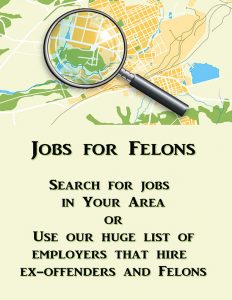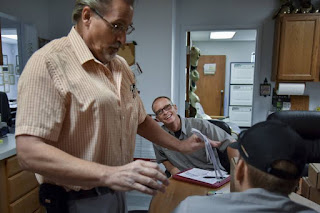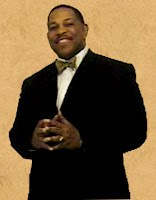Jobs for Felons: Ten Tricks Interviewers Use - Ex-offenders and felons have a very tough time finding jobs and even getting interviews. That's no secret, so when an interview finally comes, they should put themselves in the best possible position to get hired. While we all know that the applicant wants the job, the interviewer has a responsibility to hire the best person available.
In my career that spans more than thirty years, I have have seen and used a number of tricks that interviewers use to get through all of the rehearsing and other things applicants use to put themselves in the best light. These tricks are used to make applicants reveal who the really are. Often these tricks go unnoticed. I am going to share with you my all time favorite interviewer tricks.
1. The Waiting Game - I have seen applicants been made to wait up to an hour to be interviewed. What I have learned is that the longer people wait, the more they become themselves. The combination of nerves and aggravation will reveal true personalities. Whether it is using bad language, complaining, or engaging in inappropriate conversation, this is a true test. I have even seen applicants flirt with the receptionist, employees and other applicants thus exposing parts of their character. No matter how long you have to wait, stay professional at all times.
2. Just One of the Guys - Some interviewers will present themselves as really friendly types that throw formality out of the window. This often will make the applicant relax (sometimes too much,) which causes them to let their guards down. When guards come down, things slip out. I teach my students never to reveal too much information especially about their criminal backgrounds or other errors in judgement. Never offer information that isn't asked. The interview is not the place to tell your life story or talk about all of mistakes you have made in your life. Never talk about personal problems, habits, or relationships issues. Be personable but never tell more than anyone needs to know. Never talk about to religion, politics, or sex. Even If the interviewer brings them subjects up, these are not discussions you want to get into. Never, ever use slang or profanity.
3. The Big Squeeze - This neat little trick I use to when I ask applicants into my office. I stand partially in the doorway, forcing the other person turn sideways to squeeze by. In the few seconds it takes to squeeze by, I get a lot of information. I can get a hint about the individual's personal hygiene, if they have smoked recently or even taken a drink. Many employers shy away from hiring smokers. Smokers require more breaks than non-smokers. Smokers have more health problems than non-smokers. If you do smoke, do not smoke before your interview. If you have alcohol on your breath, forget it!
4. Hold up! Don't sit down! - To many people, respect and manners count for a lot and some interviewers will test this a number of ways. My favorite is sitting down and waiting to see what the applicant does. My office is like my house. If he sits down without being invited, it may be because he lacks social graces or he is simply disrespectful. When you get to the interview area, always wait until the interviewer asks you to be seated. If he doesn’t offer, politely ask “May I sit?” Never touch the interviewer’s desk or put anything on it.
5. Butter Fingers - Another one of my favorite personality revealers is very subtle but it tells a lot. I may drop a pen or other small object. If the applicant picks it up, more than likely, the person is a caring, helpful individual. If he doesn't, it usually means he cares only about himself.
Top Five Job Interview Mistakes Ex-offenders and Felons make
The next five are not really tricks, but they are clever ways interviewers weed out applicants with questions.
6. Have you Done Your Homework? - Often interviewers ask "What do you know about our company?" Interviewers ask this because they want to know if you are serious about working with them. If you haven't prepared for the interview by doing some research on the company, it will show.
It would appear that you are very interested in the job just by doing some research. Some things you should find out:
How old is the company.
Number of locations
Number of employees
What the company business
Who is the competition?
If it is a large company, you may find this information on the internet or the library. If you are interviewing with a small local business, you may get the information from the receptionist if you call.
7. Money, Money, Money - "How much money are you looking for?" This is a tricky question that is used to disqualify applicants. It's tricky because if you give a dollar amount that is too low, you may be paid less than others doing the same job. If you give an amount that is too high, you may disqualify yourself. I teach my students to never talk about money until someone offers them a job. So, the response may be "Are you offering me this job?" Whether the answer is yes or no, the response should be something like this, "I want to be paid fairly. I know you will make me a fair offer." If that answer is not enough, remember no dollar amounts, you should answer, "I want as much as you can afford to pay me."
8. I'm Feeling Weak - We all have gotten the question, "What is your greatest strength?" and we pretty much know how to handle that one. People have a a lot of trouble with the follow question which is sure to follow- "What is your biggest weakness?" Most people blow that one because they forget that the interview is used to sell yourself. With that in mind, do you think I would be foolish enough to tell you about a real fault of mine that might cost me the opportunity to get a job? Interviewers count on it! Every has weaknesses, but don't not tell the interviewer anything that can be used against you. There are two ways to handle this. You can present a strength you have as a weakness or you can offer a technical weakness as long as it has nothing to do with the job. You might say "I get really upset at myself when I don't finish everything on time." It looks like a weakness, but it come across really well because it tells how important it is for you to finish thing promptly. The second option is to offer a technical weakness (as long as it has nothing to do with the job." It may sound like this, "I want to brush up on my writing skills. I write ok, but I want to get better."
9. Bossy, Bossy - This question is used to spot a troublemaker and it works every time, "Tell me about the worst boss you've ever had?" Under no circumstances should you ever say anything negative about any past job or supervisor. To an interviewer, only a troublemaker would speak ill of former job or company. In the mind of the interviewer, you were a problem. That's why you are no longer there. It's ok to quit a job or even get fired and there are positive ways to explain even a not so great situation. You might say something like. "I have had bosses, some better than others. I have learned something from all of them even if it is what not to do."
10. I have a Question - The final one is a question that is not tricky at all, but an interviewer can find out a lot about what on an applicant's mind with it. "Do you have any questions for me?" I am amazed how often applicants answer "no" to this question. By answering "no" job searchers pass up a golden opportunity to finish off on an extremely high note. Some really great questions are:
Why is this position open?
What are the day to day duties of this position?
hat are some of the more difficult problems one would have to face in this job?
What are the opportunities for advancement?
Did you know I can be bonded? (Federal Bonding Program)
By asking questions like these the interviewer will get the impression that you are interested in more than just a paycheck, which looks really good.
Ex-offenders and felons have a tough time getting interviews so when they come, they have to make them count. These are some clever tricks that a seasoned interviewer would use to find out more about the person sitting in front of them than what they are saying. Now you will recognize them when you encounter them and make them work to your advantage!
Best of luck on your interview!
Jobs for Felons: Dirty Little Tricks Interviewers Use
Jobs for Felons: Preparing to ace the Interview
Jobs for ex-offenders and felons looking for jobs : What to wear to the interview
Are you an ex-offender or felon who has a question about finding a job with a criminal record? I have been helping ex-offenders and felons get jobs for over ten years and I feel I have an understanding of what works. I will be updating this blog often. I will answer specific questions relating to getting a job with a criminal record on this blog so feel free to send me your questions. The right information could help felons get jobs. You could have your question answered right here. Email your question to: BelievePublications@comcast.net.
If you are a felon and really serious about getting a job or you want to help someone you care about get a job, check out this link: From Jail to a Job
Find your next job here!
Jobs for Felons: Ten Tricks Interviewers Use
Companies Hire Felons | Companies That Hire Felons | Companies That Hire Ex-offenders | Employers That Hire Ex-offenders | Employers That Hire Felons | Jobs For Felons | Jobs For Ex-offenders | Jobs That Hire Felons | Resumes for Felons | Felon Friendly Jobs | Felon Friendly Employers | Jobs for Felons | Jobs For People That Have Felonies | Jobs For People With A Criminal Record | Second Chance Jobs | Fair Chance Jobs




















